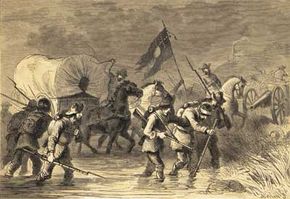Civil War After Gettysburg
Where was Ulysses S. Grant? While the Battle of Gettysburg was being fought, another, much longer, fight was taking place in Mississippi. Gen. Ulysses S. Grant led a 47-day siege on Vicksburg that ended with the town's surrender on July 4, 1863 -- the day after the Battle of Gettysburg ended. Perhaps less theatrically dramatic than Gettysburg, Vicksburg was equally, if not more, important to the Union.
By taking control of Vicksburg, Grant concluded a Western campaign that reclaimed the Mississippi River, a vital trade route, for the North. Additionally, it helped to cut the Confederacy in two, which made supplying the Southern troops that much more difficult. It's often overshadowed by Gettysburg's more symbolic victory, but Vicksburg may be the real reason July 1863 is regarded as the turning point of the war.
Advertisement
Regardless, the Civil War continued for another two years. The South would win more battles, but Lincoln's new general, Ulysses S. Grant, was much more willing to play the numbers against Lee, which the previous line of generals had been unwilling or unable to do. While considered a butcher by some, Grant would not back down after a Union defeat -- he would simply regroup and continue pursuit. He was unlike anyone Lee had faced before, and it would eventually spell the demise of the Southern Army and the Confederacy.
Related Articles
More Great Links
Sources
- "American Civil War." Encyclopedia Britannica. 2007. Encyclopedia Britannica Online. http://search.eb.com/eb/article-9006104.
- Foote, Shelby. "Stars in Their Courses: The Gettysburg Campaign." Random House, Inc.: 1963
- Gettysburg.com. http://www.gettysburg.com/
- Hartwig, D. Scott. "A Killer Angels Companion." Thomas Publications: 1996.
- Jennie Wade House Web site http://www.jennie-wade-house.com/
- The Library of Congress: American Memory. http://memory.loc.gov/ammem/today/jul03.html
- McPherson, James M. "Battle Cry of Freedom." Oxford University Press, Inc.: 1988.
- National Park Service. http://www.nps.gov/gett/
- Shaara, Michael. "The Killer Angels." Ballantine Books: 1975.
- Wheeler, Richard. "The Siege of Vicksburg: The Seven-Month Battle That Sealed the Confederacy's Fate." Thomas Y. Crowell, Publishers: 1978.
